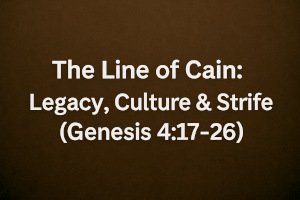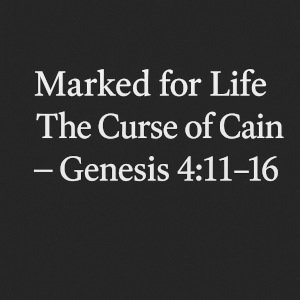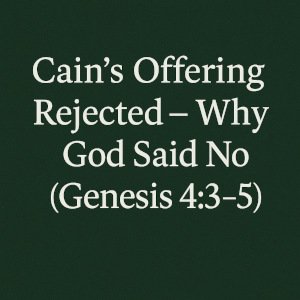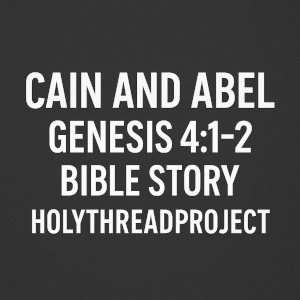The Line of Cain: Legacy, Culture & Strife (Genesis 4:17–26).
Tracing the First Civilization Born from Rebellion
Cain’s story didn’t end with a murder.
In Genesis 4:17–26, we see what becomes of humanity’s first murderer—not just personally, but generationally. What unfolds through Cain’s descendants is the birth of culture, industry, and society—but also a deepening divide from God.
This portion of Scripture, often skipped over as “just genealogy,” contains profound insight into human nature, spiritual rebellion, and the tension between progress and righteousness.
Table of Contents
Cain Builds a City: The First Step Away
After God spares Cain’s life and marks him, he settles in the land of Nod, east of Eden. There, he builds a city and names it after his son, Enoch. This is the first city mentioned in the Bible—a place born not from divine command, but human initiative.
Already, we see a key theme emerge: a legacy built apart from God’s presence. Cain’s line begins building, naming, and multiplying—while still carrying the weight of rebellion and exile.
A Lineage of Innovation… and Violence
Cain’s descendants include several notable figures:
- Jabal – the father of those who dwell in tents and raise livestock (early agriculture).
- Jubal – the father of all who play stringed instruments and pipes (music and arts).
- Tubal-cain – a forger of bronze and iron tools (metalwork and technology).
These men represent major cultural advancements. Cain’s line is responsible for the rise of civilization—urban life, music, farming, industry. There’s no denying their brilliance and creativity.
But alongside innovation, we see a growing moral decay. Lamech, a descendant of Cain, becomes infamous for his violent arrogance. In Genesis 4:23–24, he declares to his wives that he has killed a man for striking him—and claims a vengeance seventy-seven times greater than Cain’s. His boast marks a turning point: violence has become not just tolerated, but celebrated.
What began as a single act of jealousy has evolved into a culture of pride and bloodshed.
Progress Without Presence
Cain’s line forces us to confront a question that echoes through history:
What is the cost of progress when it’s disconnected from God?
Their legacy is impressive—cities, music, metalwork, livestock. But they are never said to “call upon the name of the Lord.” There’s no mention of worship, repentance, or spiritual connection. The focus is entirely on what they built—not who they walked with.
It’s a haunting reminder that cultural advancement does not equal spiritual growth. In fact, without humility and dependence on God, progress can deepen pride, lead to injustice, and sow the seeds of destruction.
A New Line Begins: Hope Through Seth
But the chapter ends with a glimmer of hope.
After Abel’s death and Cain’s exile, Adam and Eve bear another son: Seth. Through him, a different lineage begins—one that will eventually lead to Noah, Abraham, and ultimately, Jesus Christ.
Genesis 4:26 says, “At that time people began to call upon the name of the Lord.” This marks a turning point. In contrast to Cain’s line, Seth’s descendants seek God, reintroducing worship and spiritual intention into the human story.
This isn’t just genealogy—it’s a parallel narrative:
- One line pursues legacy without God,
- The other, God before legacy.
Why This Matters Today
In today’s world, we’re still living in the tension Cain’s line introduces. We build, invent, and create—but are we doing so from a place of surrender or separation?
Genesis 4:17–26 invites us to reflect on our own “lineage”—not just by blood, but by spirit. Are we building cities without God? Or are we calling on His name as we shape the world around us?

P.S. If this reflection stirred something in you, consider subscribing to Holy Thread Project on YouTube. Our goal is to weave scripture into modern life—one short thread at a time.
#Genesis #CainAndAbel #BibleShorts #BiblicalHistory #HolyThreadProject #ScriptureStudy #OldTestament #BibleWisdom #CainLineage #FaithAndCulture



